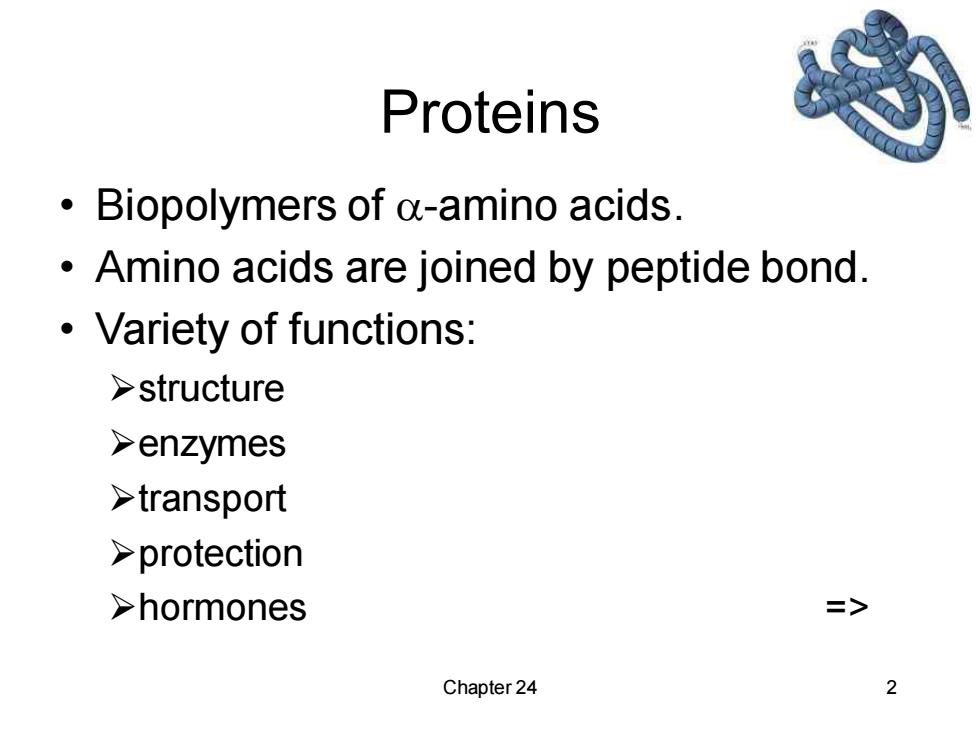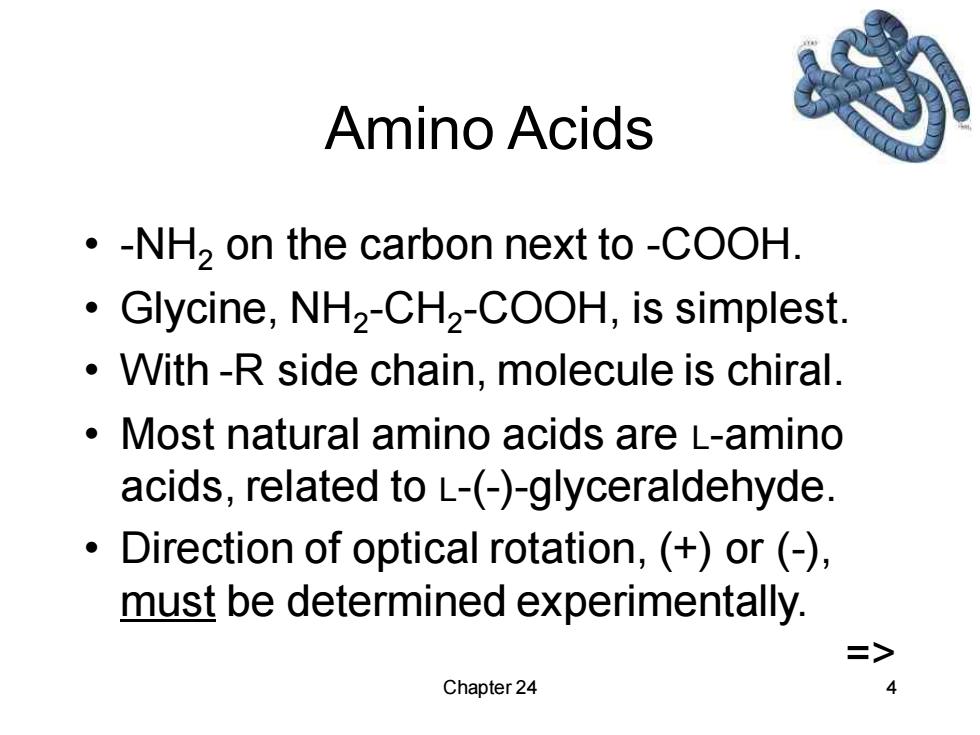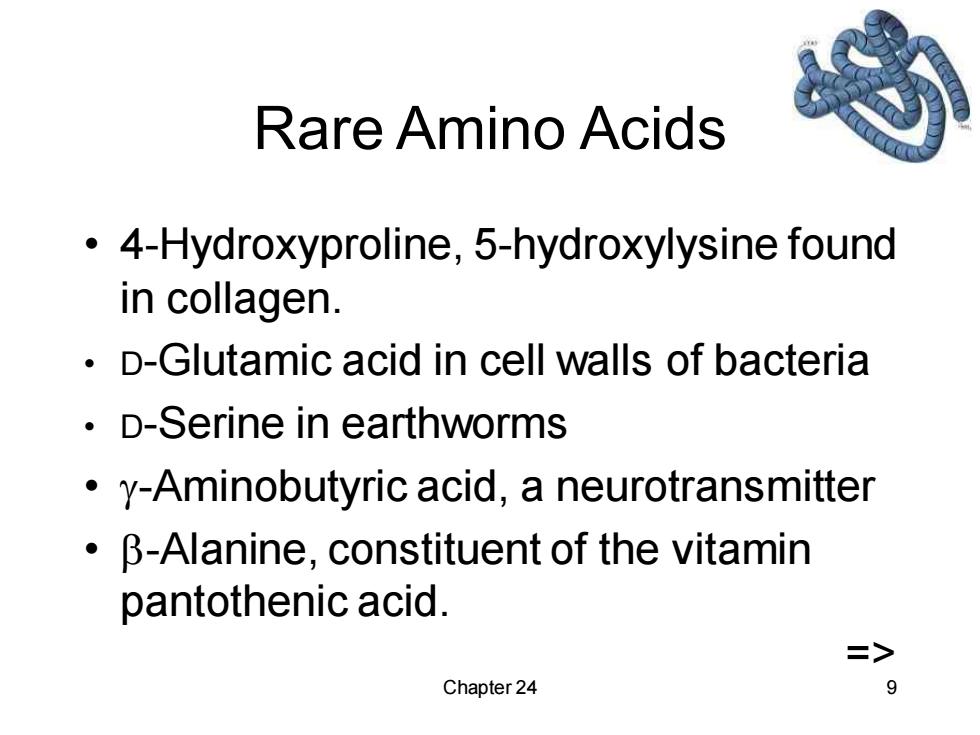
Organic Chemistry,5th Edition L.G.Wade,Jr. Chapter 24 Amino Acids. Peptides,and Proteins Jo Blackburn Richland College,Dallas,TX Dallas County Community College District ©2003,Prentice Hall
Chapter 24 Amino Acids, Peptides, and Proteins Jo Blackburn Richland College, Dallas, TX Dallas County Community College District © 2003, Prentice Hall Organic Chemistry, 5th Edition L. G. Wade, Jr

Proteins Biopolymers of a-amino acids. Amino acids are joined by peptide bond. Variety of functions: >structure >enzymes >transport >protection >hormones => Chapter 24 2
Chapter 24 2 Proteins • Biopolymers of -amino acids. • Amino acids are joined by peptide bond. • Variety of functions: ➢structure ➢enzymes ➢transport ➢protection ➢hormones =>

Structure of Proteins a carbon atom H N CH 一OH a-amino group R -side chain an d-amino acid peptide bonds 3-NH-CH-C-NH-CH一C∠NH一CH-C-NH-CH一C-NH-CH一( CH3 CH2OH H CH>SH CH(CH3)2 a short section of a protein H2N-CH-C-OH H2N-CH-C OHHN一CH一C OHHN一CH- C- OH H2N-CH- OH CH3 CHOH H CH2SH CH(CH3)2 alanine serine glycine cysteine valine individual amino acids 三> Chapter 24 3
Chapter 24 3 Structure of Proteins =>

Amino Acids .-NH2 on the carbon next to -COOH. Glycine,NH2-CH2-COOH,is simplest. With-R side chain,molecule is chiral. Most natural amino acids are L-amino acids,related to L-(-)-glyceraldehyde. Direction of optical rotation,(+)or () must be determined experimentally. > Chapter 24
Chapter 24 4 Amino Acids • -NH2 on the carbon next to -COOH. • Glycine, NH2 -CH2 -COOH, is simplest. • With -R side chain, molecule is chiral. • Most natural amino acids are L-amino acids, related to L-(-)-glyceraldehyde. • Direction of optical rotation, (+) or (-), must be determined experimentally. =>

Stereochemistry of a-Amino Acids COOH CHO COOH HO H CCH-OH H COOH CHO COOH H2N- -H HO H H2N- H CH3 CH,OH R (S)-alanine L-(-)-glyceraldehyde an L-amino acid (L-alanine) (S)configuration => Chapter 24 5
Chapter 24 5 Stereochemistry of -Amino Acids =>

Standard Amino Acids Twenty standard a-amino acids. Differ in side-chain characteristics: >-H or alkyl >contains an -OH >contains sulfur >contains a nonbasic nitrogen >has -COOH >has a basic nitrogen => Chapter 24 6
Chapter 24 6 Standard Amino Acids • Twenty standard -amino acids. • Differ in side-chain characteristics: ➢ -H or alkyl ➢contains an -OH ➢contains sulfur ➢contains a nonbasic nitrogen ➢has -COOH ➢has a basic nitrogen =>

Essential Amino Acids ·Arginine(Arg) ·Tryptophan(Trp) ·Threonine(Thr) ·Methionine(Met) ·Lysine(Lys) ·Histidine(His) ·Valine (Val) ·Leucine(Leu) ·Phenylalanine(Phe)·Isoleucine(le) => Chapter 24 7
Chapter 24 7 Essential Amino Acids • Arginine (Arg) • Threonine (Thr) • Lysine (Lys) • Valine (Val) • Phenylalanine (Phe) • Tryptophan (Trp) • Methionine (Met) • Histidine (His) • Leucine (Leu) • Isoleucine (Ile) =>

Complete Proteins Provide all the essential amino acids. Examples:those in meat,fish,milk,eggs. Plant proteins are generally incomplete. Vegetarians should eat many different kinds of plants,or supplement diet with milk or eggs. > Chapter 24 8
Chapter 24 8 Complete Proteins • Provide all the essential amino acids. • Examples: those in meat, fish, milk, eggs. • Plant proteins are generally incomplete. • Vegetarians should eat many different kinds of plants, or supplement diet with milk or eggs. =>

Rare Amino Acids 4-Hydroxyproline,5-hydroxylysine found in collagen. D-Glutamic acid in cell walls of bacteria D-Serine in earthworms y-Aminobutyric acid,a neurotransmitter B-Alanine,constituent of the vitamin pantothenic acid. > Chapter 24 0
Chapter 24 9 Rare Amino Acids • 4-Hydroxyproline, 5-hydroxylysine found in collagen. • D-Glutamic acid in cell walls of bacteria • D-Serine in earthworms • -Aminobutyric acid, a neurotransmitter • -Alanine, constituent of the vitamin pantothenic acid. =>

Zwitterion Amino acid exists as a dipolar ion. .-COOH loses H+,-NH2 gains H+. HN-CH-C-OHHN CHc-o R R uncharged structure dipolar ion,or zwitterion (minor component) (major component) Actual structure depends on pH. Chapter 24 => 10
Chapter 24 10 Zwitterion • Amino acid exists as a dipolar ion. • -COOH loses H+ , -NH2 gains H+ . • Actual structure depends on pH. =>